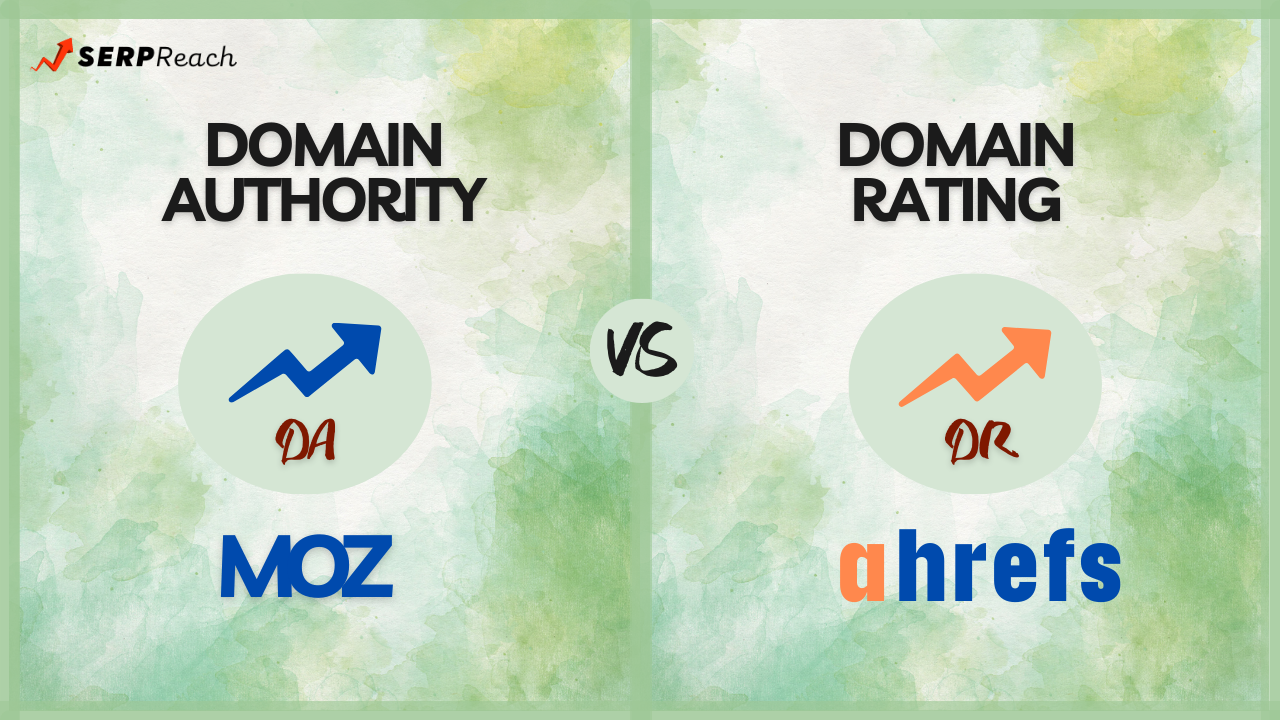While Domain Authority, DA, and Domain Rating, DR, are used interchangeably, they are different and suit different needs. So, which one is better for you? Find out in this article!
If you ever thought DA (Domain Authority) and DR (Domain Rating) [and others like AS (Authority Score)] meant the same thing, you’re not alone. I thought so, too, back in 2009.
I know better now that the ratings are not the same thing. More importantly, I discovered they suit different SEO (Search Engine Optimization) needs.
Keep reading to learn everything I discovered — from definitions, differences & similarities to shortcomings.
Let’s start from the basics…
What Is Domain Authority?
Domain Authority is a scoring system designed by Moz [an SEO tool]. To define it clearly, let’s quote the words from the horse’s mouth.
According to Moz:
“Domain Authority is a search engine ranking score that predicts the likeliness of a site to rank in search engine results pages.”
How Is DA Calculated?
Moz bases the DA calculations [a logarithmic scale 0 – 100] on data collected [considering dozens of factors] by its machine learning model [Link Explorer Index].
In other words, the whole thing [your website’s authority] is based on prediction. This means there will be fluctuations depending on the changes to the “multiple factors.”
📌 What are these factors?
Unfortunately, Moz didn’t list them out. However, it did mention two: the total number of backlinks [high authority backlinks] and linking root domains.
Interestingly, increasing your DA score at the lower end of the scale is easy. The story is different for the higher ends.
How Do You Measure/Check Your DA Score?
As DA is a Moz metric, you’ll use the brand’s tools. And those are:
- Link Explorer, and
- MozBar
You can also use Moz’s free domain authority checker. But you will be limited to 3 reports daily.
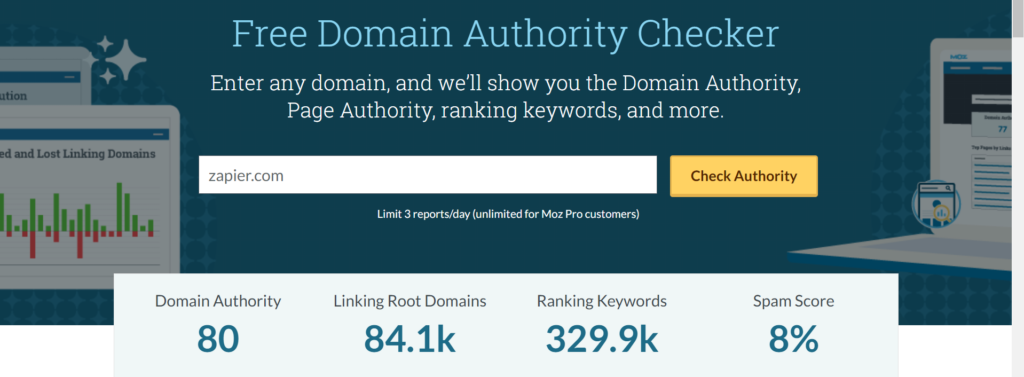
📌 Are DA and AS the same?
No! The former is developed by Moz, while the latter is a Semrush metric.
Also, while DA uses dozens of factors to determine its score, AS uses only 8 factors.

What Is Domain Rating?
Like domain authority, domain rating is another rating system. It is a metric developed by Ahrefs [another SEO tool].
Here is how they [Ahrefs] defined DR:
Domain Rating is a rating score that shows the relative strength of a website’s link profile.
Put simply, DR focuses on linking root domains and backlinks. As a result, it is more of a metric for “link popularity.”
How Is DR Calculated?
Unlike DA [or AS], DR does not consider dozens of factors. It solely focuses on a website’s backlink profile.
The idea is based on unique, dofollow links from different [but authoritative] websites. The more of these you have, the higher your DR score.
What I love about DR scores is the potential to leverage the efforts of your referring domains. If they [your referring domains] continue building their link profile, the juice will drip to your domain.
How Do You Measure/Check Your DR Score?
Like Moz, Ahrefs has dedicated tools for checking DR scores. They include:
- Site Explorer
- Content Explorer
Also, Ahrefs has a free domain rating checker.
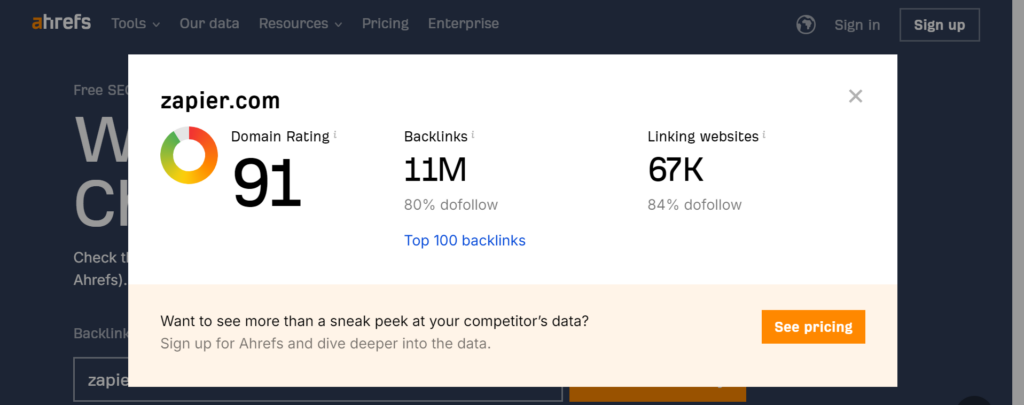
Note: you can toggle between the options on the FREE Ahrefs checker to evaluate your site’s inbound links and broken links.
DA vs DR: What Are the Differences?
There are two significant differences between DA and DR:
- Focus
- Metrics
Focus
As discussed earlier [in the definition], DR has a sole focus. It revolves entirely around a site’s backlink profile, i.e., link popularity.
While such singleness is not bad, it is limited and doesn’t paint the complete picture of a website’s health. After all, backlinks are only one of the many direct ranking factors.
How about DA?
Unlike DR, DA considers dozens of factors to determine its score. As a result, it focuses on a website’s overall health.
Metrics
While there are similarities in DA and DR metrics, there are distinct differences. Here’s a closer look:
DA Metrics
- MozRank — is a metric that reflects the link popularity of a site. It assesses the quality and quantity of a website’s backlinks. The higher the numbers, the more chances of a high score.
- MozTrust — Moz doesn’t base its rating system on numbers and perceived high quality backlinks. Instead, it balances the scales by checking the trustworthiness of the linking domain. In that sense, only links from reputable sources count.
- User experience — Moz considers users’ overall satisfaction while navigating your website. One contributing factor is your design and structure. A structured website with a responsive design will likely have a better score.
The other crucial factor is your content quality. Valuable content will make users happy. More importantly, such will attract backlinks from other websites.
Bottom line:
If your website fulfills the metrics, it will have a high DA score.
DR Metrics
- Backlinks — Ahrefs considers the number of high quality links pointing to a site receives to determine its DR score. But that is not all there is to the calculation process. The backlink types also matter.
For specifics, only links with unrestricted juice flow matters to DR scores. These are called “dofollow links.”
Note:
Dispute claims that nofollow links are not useless. They can still contribute to your referral traffic and even sales.
- Referring domains — this metric is similar to Moz linking root domains. However, Ahrefs’ version has more specifics.
For starters, your DR won’t increase just by packing several backlinks from the same domains. The domains must be unique.
Interestingly, the more links you get from the same domain, the less your DR score will increase.
- Internal linking — is like a tunnel system for link equity. When correctly done, the equity will flow through your site and increase your domain rating.
Internal links are not just for link equity. They also aid user engagement & satisfaction.
📌 Are there any similarities between DA, DR, and AS?
Yes! For starters, they are all metrics developed by third-party SEO tools. Also, they use a logarithmic scale — the higher the ratings, the less the speed of increase.
Furthermore, all the metrics consider link profiles.
Another similarity to SEO metrics is how to increase them. While the focus might defer [for each metric], you can improve your DA or DR using the same strategies.
How to Increase Your DA and DR Scores
1. Valuable content
2. Build authoritative backlinks
3. Internal linking
4. Mobile friendliness
5. Site speed and security
Valuable Content
Content is the foundation of every SEO strategy/campaign. However, just any content, especially unedited AI content, won’t suffice.
In essence, your content must be valuable, helpful, and authoritative. How?
First, your content must be original and unique. Discuss your unique experiences and examples.
Second, your content must focus on users’ intent:
● What are users searching for?
● What problem do they want to solve?
● And what actions will they like to take?
● Does your content meet those needs?
The bottom line is that your SEO performance improves when you publish quality content that matches the user’s needs and expectations. And so will your DA and DR scores.
Furthermore, when your content offers value, you will attract more website traffic and organic quality backlinks. Ultimately, these will increase your DA and DR scores.
Build Authoritative Backlinks
In construction, the next step after setting a foundation is laying bricks. That is also how things work in SEO.
Building authoritative backlinks to your already well-laid valuable content is laying the bricks.
And the more bricks you add, the quicker you can get to your desired structure.
In other words, the more high-authority websites in your niche link to your web pages, the higher the chances of SEO success. Hence, your DA and DR scores will increase.
📌 But why target authoritative backlinks?
High-authority websites have high domain authority, and earning backlinks from them will help increase yours. More importantly, they are reputable brands trusted by people [your target audience].
Internal Linking
As much as other websites are linking to your page, you need internal links to keep your pages linked.
Doing this helps you move link juice from one page to another on your website, increasing your DA and DR scores.
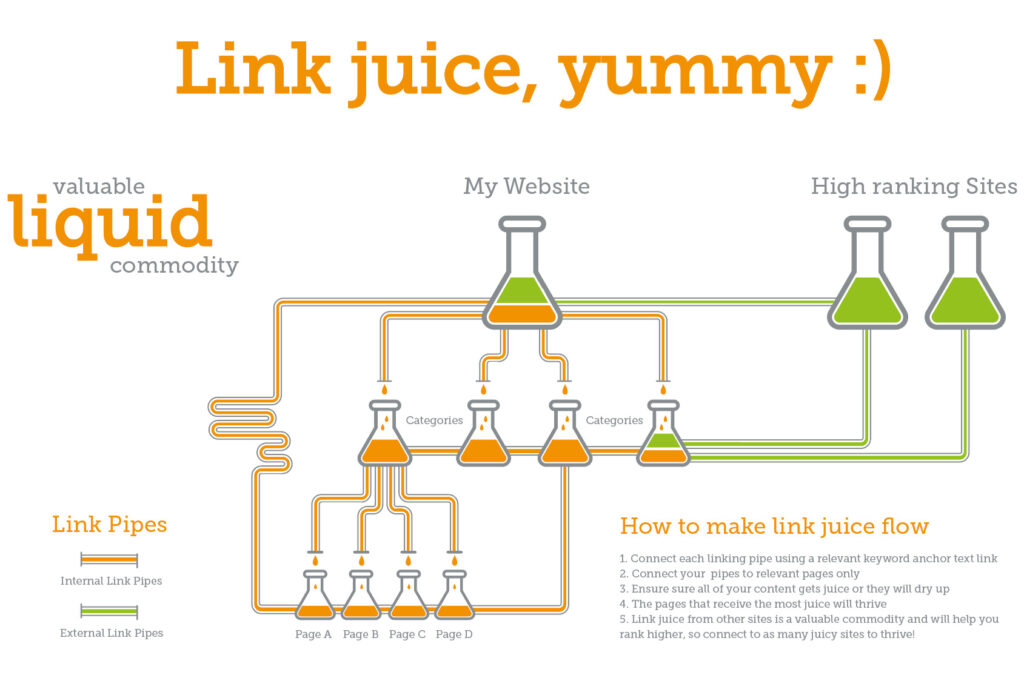
Additionally, with internal linking, search engines will easily crawl and index your pages. This will increase your website’s ranking potential. In the long run, this will expose you to gaining more backlinks.
Lastly, internal linking keeps visitors engaged by suggesting related content to satisfy their curiosity. Otherwise, your organic website traffic will be low. This means you can forget about ranking high on Google SERPs [or high DA/DR scores].
Mobile Friendliness
Mobile friendliness is a confirmed ranking factor. Without it, it won’t matter if you build 1000 backlinks. Your DA score won’t increase.
Note: DR might increase as it is more about the backlink profile.
In essence, ensure that your website is mobile-friendly. More importantly, use responsive designs. This will help visitors easily access your content from any device, be it a desktop or Android.
📌 Bottom line:
The more mobile-friendly your website is, the higher it will rank in search results. This will attract more backlinks and increase your DA and DR scores.
Site Speed and Security
Like mobile friendliness, speed, and security are crucial ranking factors. How so?
For starters, a slow-loading page will lead to a high bounce rate. Unfortunately, when that happens, Google will see your content as invaluable and send less traffic.
The same idea applies to security. Google won’t send traffic to an insecure site.
How do all these relate to DA/DR scores?
When you don’t get traffic, your pages won’t rank. This means less backlinks. Hence, your ratings won’t increase.
📌 Bottom line:
Your website’s visitors must be able to seamlessly engage with your content [and feel safe while at it] without leaving halfway. That satisfaction will boost your ranking chances as well as your domain rating.
Now that we’ve handled the basics, let’s answer the quintessential question: is DA better than DR?
DA vs DR: Which One Is Better for SEO?
I’ve noticed that sites with high DA end up having high DR. However, the case would be different if the roles were reversed. How so?
Check out these examples:
Sample 1
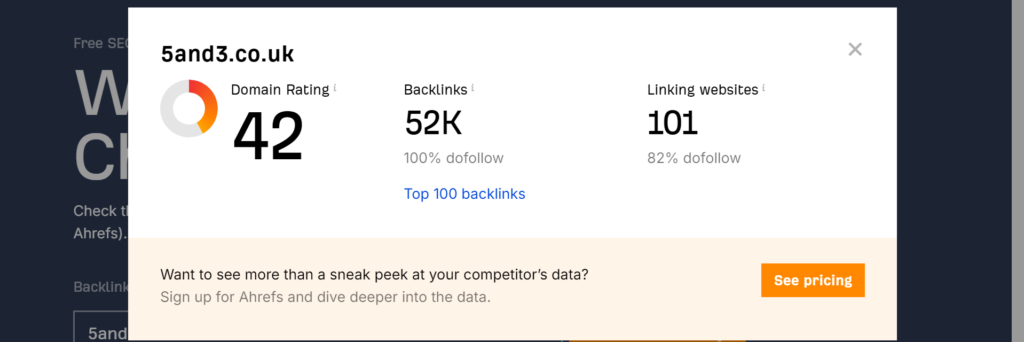

Sample 2
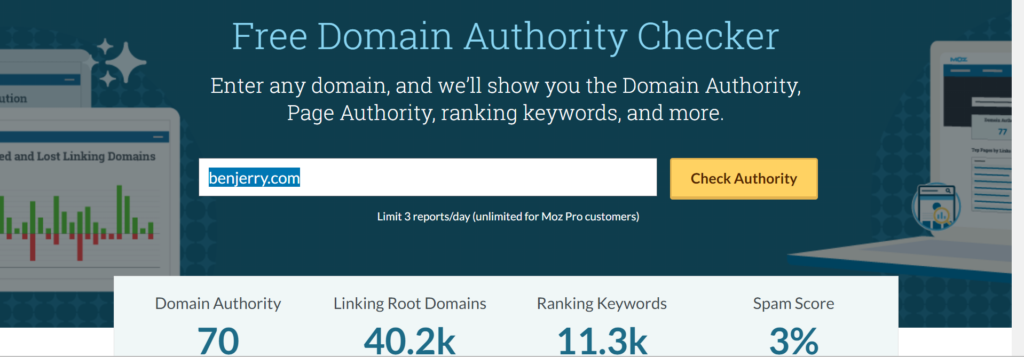
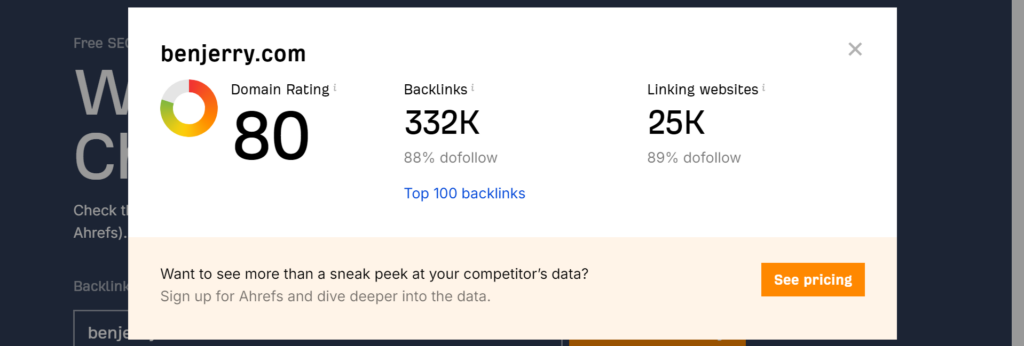
Sample 3
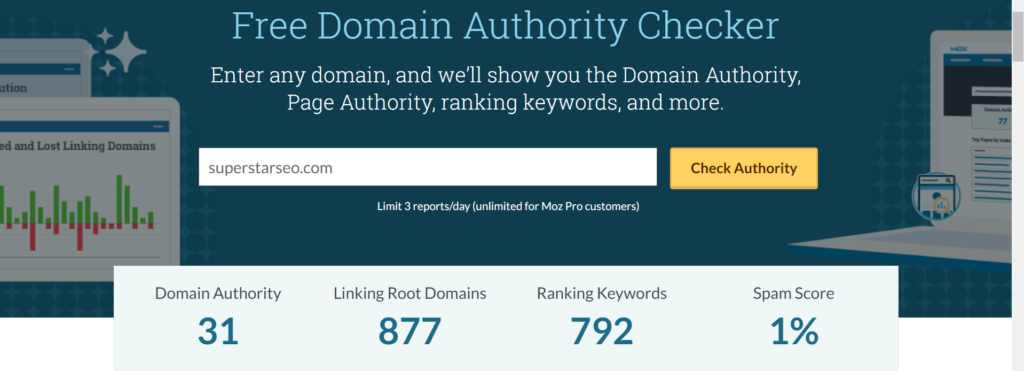
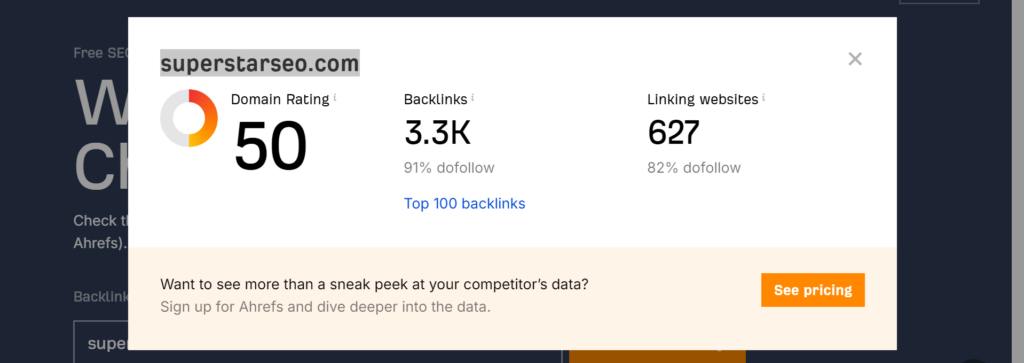
So, what should you make of the screenshots? Am I saying DA is better than DR for SEO?
No!
DA is not a better metric than DR, and vice versa. What you need depends on your focus.
So, what are you focusing your SEO campaign on?
- Do you only care about backlinks — quality and quantity?
If this is your case, the DR metric will suffice. It will come in handy, especially for link prospecting.
- Do you want a holistic approach to tackle your SEO issues?
If yes, the DA metric will help you get as close to your aim as possible.
📌 My recommendation:
You don’t necessarily have to choose DA over DR or vice versa. Combine the two metrics; find the middle ground and use that to guide your SEO campaigns.
Should You Base Your SEO on DA and DR Metrics?
To better answer the question, let’s look at these crucial talk points:
- DA & DR influences on search engine results pages
- DA/DR scores can be manipulated
- Google’s [and other search engines] stance on DA & DR
Does DA/DR Affect Search Engine Results Pages?
The best answer to this question is Ahrefs’ response. It reads:
“Google ranks pages not your website’s domain authority or domain rating…”
Besides, DA or DR, as earlier stated, are not Google ranking factors. Google doesn’t use these metrics, let alone make them the cornerstone of search engine result pages.
So, to answer the question:
No, your DA/DR scores do not affect your search engine rankings. That is why a page with a low score [but high-quality content that matches the user’s intent] can rank higher than a high score [but fluffy, non-helpful content].
Wait, am I saying there’s no relationship between DA/DR scores and search ranking?
No. I’m saying DR/DA depends on search ranking. Here is how:
You will increase your link building potential if you rank high on search results. Your scores will increase when the links come, as shown below.
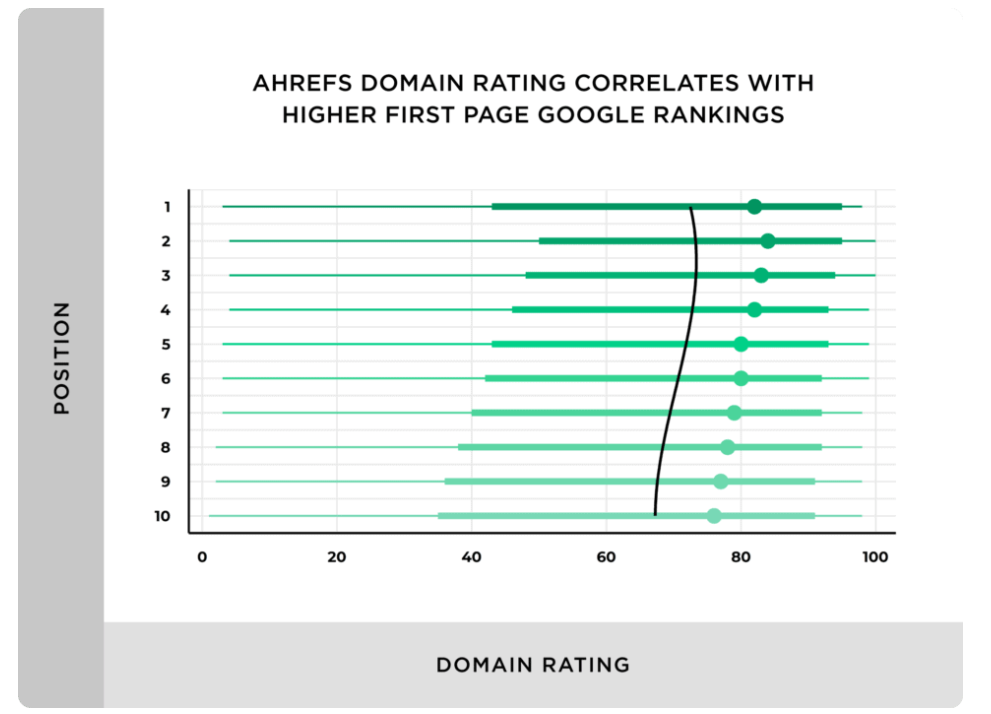
Can DA/DR Scores Be Manipulated?
Yes…
People use aged/expired domains with handsome link profiles to boost DA/DR scores. In other words, you can have a high rating and still not be worth it. Google won’t be fooled.
What Is Google [And Other Search Engines] Saying?
There was a back and forth [from 2015 — 2022], as reported extensively by Search Engine Journal. And through it all, Google representatives reiterated that DA & DR are not ranking factors, nor are they ever used.
Here’s the first response:

Here’s the last one:
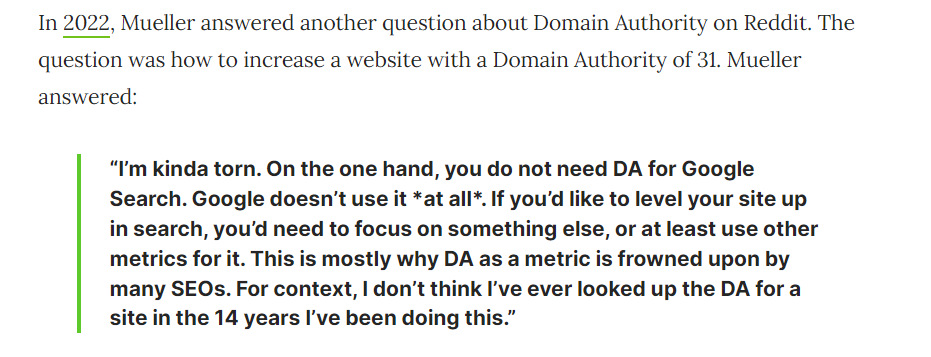
📌 My deduction from the back and forth:
Google might have a ranking factor similar to DA/DR. But that’s all about the similarity.
Plus, I doubt Google will use a third-party metric system to rank the pages on its assets. It doesn’t make sense.
Back to the question…
I won’t recommend making DA/DR scores the core of your SEO campaign. Don’t discard them either; they might be helpful in smaller parts, like link prospecting.
There Is More to SEO Than DA and DR Metrics
SEO is a robust system of online marketing. It involves a myriad of techniques, factors, and players. DA and DR scores are just a part of that.
And mind you, none of the scores are better than each other. They are only best suited for different purposes.
For example, I use DR specifically for qualifying and prospecting link targets. On the other hand, I use DA to ascertain the targets’ overall health.
Be like me; combine the metrics and get the most results for yourself and your clients.
